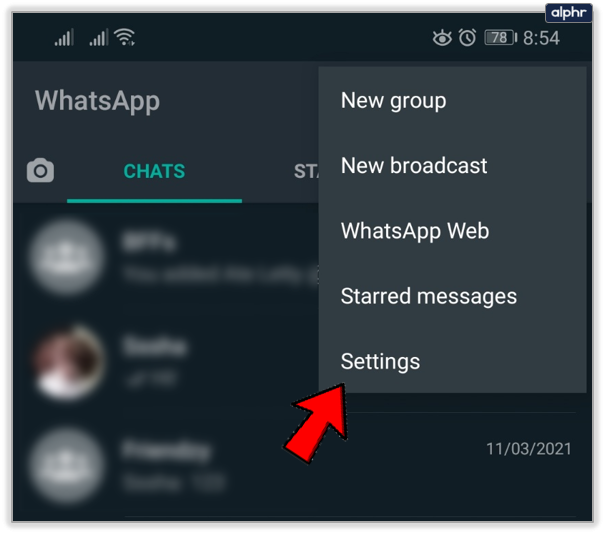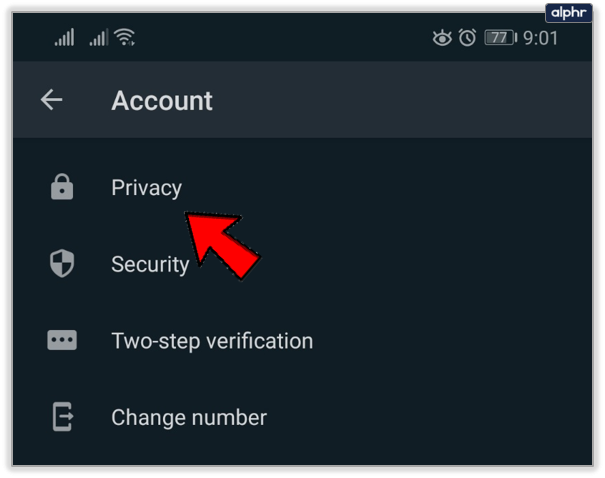WhatsApp is one of the most popular communication apps. In the beginning, people used it to send messages and make quick calls. Today, there are various ways to stay in touch with your friends and family through WhatsApp. You can send them photos, videos, voice messages, etc.
When it comes to profile picture on WhatsApp, there are two groups of people. The first group contains people who like to change their profile picture often. The other group hasn’t changed their profile picture for years.
How to Change Profile Picture?
If you haven’t changed your profile picture in a while, this is a perfect time to do it. We guarantee that you’ll receive a couple of messages from your friends complimenting your new looks. You can do it with a few taps:
- Enter WhatsApp.

- Click on the three dotted icon in the top right corner and tap Settings.

- Then click on your photo that will appear on the top. If you don’t have one yet, you will see a gray space. That’s where your photo should be.

- Now you’ve entered the section ‘Edit Profile.’ You should tap on your photo one more time.

- Then, tap on the Edit button in the top right corner.

- You will get three options: to delete the photo, to take one, or to choose from your Gallery/Camera Roll. Choose one.

If you already know which photo you would like to use as your profile photo, select the option Choose photo and then choose the desired image from your gallery. You can move and scale the picture and decide how you would like your contacts to see it.
If you are feeling pretty, choose the Take photo option and make a selfie. Of course, if you don’t like it, you don’t have to save it. You can take another photo or pick one from your gallery.
Can I Hide My Profile Picture?
It’s possible to hide your profile picture from people who are not in your contacts. We suggest you do this as it will improve your online safety. However, it’s not possible to hide your profile picture only from specific contacts.
If you have an inappropriate photo and you don’t want your mum to see it, there are only two things you can do. Hide the profile picture from everyone so only you can see it (but what’s the point then?), or remove your mum from your contacts list (and hope that she doesn’t notice).
Here’s how to limit who will see your photo:
- Go to the Settings.

- Tap on Account.

- Tap on Privacy.

- Click on Profile Photo.

- You’ll get to choose from three options: Everyone, My Contacts, and Nobody.

Unfortunately, you can’t select ‘Hide from’ and then type the names of some contacts who you don’t want to see your photo. We suggest you opt for the option My Contacts and allow only people who you are connected with to see your profile picture. You never know who can get your phone number, and you should protect your profile and yourself from strangers.
Can I Have Multiple Profile Pictures?
It’s one of the questions that people often ask. And it perfectly makes sense because it’d be nice to have multiple profile pictures. It’d be great to set one profile picture for your friends (where you are relaxed and casual) and the other for your colleagues (professional photo). Unfortunately, that’s not possible.
We don’t exclude the possibility that WhatsApp will allow this feature soon as many users have been asking for it. It would be entertaining to have that option.
Frequently Asked Questions
Can I assign profile pictures for my contacts?
One of the more fun aspects of adding contacts is the option to assign photos to them. Older versions of WhatsApp did allow you to add other people’s photos if they didn’t add one. Unfortunately, these daysWhatsApp doesn’t give us that option. Only the contacts’ themselves can add their profile pictures.
Can I hide my profile picture from only one person?
The only way to hide your profile picture from only one person is to block them. To do this you need to navigate to the contact in WhatsApp, scroll all the way down to their profile page and tap on ‘Block.’

Once you do this, you’ll no longer see the contact and they will no longer see you.
A Picture Is Worth a Thousand Words
When choosing your new profile picture, think about what you want that picture to say about you. Do you want to appear professional, or you’d like to show how casual and easy-going you are?
What kind of photo would you put as your profile picture? Would you opt for a serious or laid-back version? Or maybe you’ll put a picture of your dog? Feel free to hit the comments section below.
Disclaimer: Some pages on this site may include an affiliate link. This does not effect our editorial in any way.
















